- Home
- Dante Alighieri
The Vision of Dante Alighiere or Hell, Purgatory and Paradise Page 16
The Vision of Dante Alighiere or Hell, Purgatory and Paradise Read online
Page 16
v. 50. That these people.] That the inhabitants of the above-
mentioned places had not been mixed with the citizens: nor the
limits of Florence extended beyond Galluzzo and Trespiano."
v. 54. Aguglione's hind and Signa's.] Baldo of Aguglione, and
Bonifazio of Signa.
v. 56. Had not the people.] If Rome had continued in her
allegiance to the emperor, and the Guelph and Ghibelline factions
had thus been prevented, Florence would not have been polluted by
a race of upstarts, nor lost the most respectable of her ancient
families.
v. 61. Simifonte.] A castle dismantled by the Florentines. G.
Villani, 1. v. c. 30. The individual here alluded to is no
longer known.
v. 69. The blind bull.] So Chaucer, Troilus and Cresseide. b.
2.
For swifter course cometh thing that is of wight
When it descendeth than done things light.
Compare Aristotle, Ethic. Nic. l. vi. c. 13. [GREEK HERE]
v. 72. Luni, Urbisaglia.] Cities formerly of importance, but
then fallen to decay.
v. 74. Chiusi and Sinigaglia.] The same.
v. 80. As the moon.] "The fortune of us, that are the moon's
men doth ebb and flow like the sea." Shakespeare, 1 Henry IV.
a. i. s. 2.
v. 86. The Ughi.] Whoever is curious to know the habitations of
these and the other ancient Florentines, may consult G. Villani,
l. iv.
v. 91. At the poop.] Many editions read porta, "gate." -The
same metaphor is found in Aeschylus, Supp. 356, and is there also
scarce understood by the critics. [GREEK HERE] Respect these
wreaths, that crown your city's poop.
v. 99. The gilded hilt and pommel.] The symbols of knighthood
v. 100. The column cloth'd with verrey.] The arms of the Pigli.
v. 103. With them.] Either the Chiaramontesi, or the Tosinghi
one of which had committed a fraud in measuring out the wheat
from the public granary. See Purgatory, Canto XII. 99
v. 109. The bullets of bright gold.] The arms of the Abbati, as
it is conjectured.
v. 110. The sires of those.] "Of the Visdomini, the Tosinghi
and the Cortigiani, who, being sprung from the founders of the
bishopric of Florence are the curators of its revenues, which
they do not spare, whenever it becomes vacant."
v. 113. Th' o'erweening brood.] The Adimari. This family was
so little esteemed, that Ubertino Donato, who had married a
daughter of Bellincion Berti, himself indeed derived from the
same stock (see Note to Hell Canto XVI. 38.) was offended with
his father-in-law, for giving another of his daughters in
marriage to one of them.
v. 124. The gateway.] Landino refers this to the smallness of
the city: Vellutello, with less probability, to the simplicity of
the people in naming one of the gates after a private family.
v. 127. The great baron.] The Marchese Ugo, who resided at
Florence as lieutenant of the Emperor Otho III, gave many of the
chief families license to bear his arms. See G. Villani, 1. iv.
c. 2., where the vision is related, in consequence of which he
sold all his possessions in Germany, and founded seven abbeys, in
one whereof his memory was celebrated at Florence on St. Thomas's
day.
v. 130. One.] Giano della Bella, belonging to one of the
families thus distinguished, who no longer retained his place
among the nobility, and had yet added to his arms a bordure or.
See Macchiavelli, 1st. Fior. 1. ii. p. 86. Ediz. Giolito.
v. 132. -Gualterotti dwelt
And Importuni.]
Two families in the compartment of the city called Borgo.
v. 135. The house.] Of Amidei. See Notes to Canto XXVIII. of
Hell. v. 102.
v. 142. To Ema.] "It had been well for the city, if thy
ancestor had been drowned in the Ema, when he crossed that stream
on his way from Montebuono to Florence."
v. 144. On that maim'd stone.] See Hell, Canto XIII. 144. Near
the remains of the statue of Mars. Buondelmonti was slain, as if
he had been a victim to the god; and Florence had not since known
the blessing of peace.
v. 150. The lily.] "The arms of Florence had never hung
reversed on the spear of her enemies, in token of her defeat; nor
been changed from argent to gules;" as they afterwards were, when
the Guelfi gained the predominance.
CANTO XVII
v. 1. The youth.] Phaeton, who came to his mother Clymene, to
inquire of her if he were indeed the son of Apollo. See Ovid,
Met. 1. i. ad finem.
v. 6. That saintly lamp.] Cacciaguida.
v. 12. To own thy thirst.] "That thou mayst obtain from others
a solution of any doubt that may occur to thee."
v. 15. Thou seest as clear.] "Thou beholdest future events,
with the same clearness of evidence, that we discern the simplest
mathematical demonstrations."
v. 19. The point.] The divine nature.
v. 27. The arrow.]
Nam praevisa minus laedere tela solent.
Ovid.
Che piaga antiveduta assai men duole.
Petrarca, Trionfo del Tempo
v. 38. Contingency.] "The evidence with which we see the future
portrayed in the source of all truth, no more necessitates that
future than does the image, reflected in the sight by a ship
sailing down a stream, necessitate the motion of the vessel."
v. 43. From thence.] "From the eternal sight; the view of the
Deity.
v. 49. There.] At Rome, where the expulsion of Dante's party
from Florence was then plotting, in 1300.
v. 65. Theirs.] "They shall be ashamed of the part they have
taken aga'nst thee."
v. 69. The great Lombard.] Either Alberto della Scala, or
Bartolommeo his eldest son. Their coat of arms was a ladder and
an eagle.
v. 75. That mortal.] Can Grande della Scala, born under the
influence of Mars, but at this time only nine years old
v. 80. The Gascon.] Pope Clement V.
v. 80. Great Harry.] The Emperor Henry VII.
v. 127. The cry thou raisest.] "Thou shalt stigmatize the
faults of those who are most eminent and powerful."
CANTO XVIII
v. 3. Temp'ring the sweet with bitter.]
Chewing the end of sweet and bitter fancy.
Shakespeare, As you Like it, a. 3. s. 3.
v. 26. On this fifth lodgment of the tree.] Mars, the fifth ot
the @
v. 37. The great Maccabee.] Judas Maccabeus.
v. 39. Charlemagne.] L. Pulci commends Dante for placing
Charlemagne and Orlando here:
Io mi confido ancor molto qui a Dante
Che non sanza cagion nel ciel su misse
Carlo ed Orlando in quelle croci sante,
Che come diligente intese e scrisse.
Morg. Magg. c. 28.
v. 43. William and Renard.] Probably not, as the commentators
have imagined, William II of Orange, and his kinsman Raimbaud,
two of the crusaders under Godfrey of Bouillon, (Maimbourg, Hist.
des Croisades, ed. Par. 1682. 12mo. t. i. p. 96.) but rather the
two more celeb
rated heroes in the age of Charlemagne. The
former, William l. of Orange, supposed to have been the founder
of the present illustrious family of that name, died about 808,
according to Joseph de la Piser, Tableau de l'Hist. des Princes
et Principante d'Orange. Our countryman, Ordericus Vitalis,
professes to give his true life, which had been misrepresented in
the songs of the itinerant bards." Vulgo canitur a joculatoribus
de illo, cantilena; sed jure praeferenda est relatio
authentica." Eccl. Hist. in Duchesne, Hist. Normann Script.
p. 508. The latter is better known by having been celebrated by
Ariosto, under the name of Rinaldo.
v. 43. Duke Godfey.] Godfrey of Bouillon.
v. 46. Robert Guiscard.] See Hell, Canto XXVIII. v. 12.
v. 81. The characters.] Diligite justitiam qui judicatis
terrarm. "Love righteousness, ye that be judges of the earth "
Wisdom of Solomon, c. i. 1.
v. 116. That once more.] "That he may again drive out those who
buy and sell in the temple."
v. 124. Taking the bread away.] "Excommunication, or the
interdiction of the Eucharist, is now employed as a weapon of
warfare."
v. 126. That writest but to cancel.] "And thou, Pope Boniface,
who writest thy ecclesiastical censures for no other purpose than
to be paid for revoking them."
v. 130. To him.] The coin of Florence was stamped with the
impression of John the Baptist.
CANTO XIX
v. 38. Who turn'd his compass.] Compare Proverbs, c. viii. 27.
And Milton, P. L. b. vii 224.
v. 42. The Word] "The divine nature still remained
incomprehensible. Of this Lucifer was a proof; for had he
thoroughly comprehended it, he would not have fallen."
v. 108. The Ethiop.] Matt. c. xii. 41.
v. 112. That volume.] Rev. c. xx. 12.
v. 114. Albert.] Purgatory, Canto VI. v. 98.
v. 116. Prague.] The eagle predicts the devastation of Bohemia
by Albert, which happened soon after this time, when that Emperor
obtained the kingdom for his eldest son Rodolph. See Coxe's
House of Austria, 4to. ed. v. i. part 1. p. 87
v. 117. He.] Philip IV of France, after the battle of Courtrai,
1302, in which the French were defeated by the Flemings, raised
the nominal value of the coin. This king died in consequence of
his horse being thrown to the ground by a wild boar, in 1314
v. 121. The English and Scot.] He adverts to the disputes
between John Baliol and Edward I, the latter of whom is commended
in the Purgatory, Canto VII. v. 130.
v. 122. The Spaniard's luxury.] The commentators refer this to
Alonzo X of Spain. It seems probable that the allusion is to
Ferdinand IV who came to the crown in 1295, and died in 1312, at
the age of twenty four, in consequence, as it was supposed, of
his extreme intemperance.
See Mariana, Hist I. xv. c. 11.
v. 123. The Bohemian.] Winceslaus II. Purgatory, Canto VII. v.
v. 125. The halter of Jerusalem.] Charles II of Naples and
Jerusalem who was lame. See note to Purgatory, Canto VII. v.
122, and XX. v. 78.
v. 127. He.] Frederick of Sicily son of Peter III of Arragon.
Purgatory, Canto VII. v. 117. The isle of fire is Sicily, where
was the tomb of Anchises.
v. 133. His uncle.] James, king of Majorca and Minorca, brother
to Peter III.
v. 133. His brother.] James II of Arragon, who died in 1327.
See Purgatory, Canto VII. v. 117.
v. 135. Of Portugal.] In the time of Dante, Dionysius was king
of Portugal. He died in 1328, after a reign of near forty-six
years, and does not seem to have deserved the stigma here
fastened on him. See Mariana. and 1. xv. c. 18. Perhaps the
rebellious son of Dionysius may be alluded to.
v. 136. Norway.] Haquin, king of Norway, is probably meant;
who, having given refuge to the murderers of Eric VII king of
Denmark, A D. 1288, commenced a war against his successor, Erie
VIII, "which continued for nine years, almost to the utter ruin
and destruction of both kingdoms." Modern Univ. Hist. v. xxxii
p. 215.
v. 136. -Him
Of Ratza.]
One of the dynasty of the house of Nemagna, which ruled the
kingdom of Rassia, or Ratza, in Sclavonia, from 1161 to 1371, and
whose history may be found in Mauro Orbino, Regno degli Slavi,
Ediz. Pesaro. 1601. Uladislaus appears to have been the sovereign
in Dante's time, but the disgraceful forgery adverted to in the
text, is not recorded by the historian v. 138. Hungary.] The
kingdom of Hungary was about this time disputed by Carobert, son
of Charles Martel, and Winceslaus, prince of Bohemia, son of
Winceslaus II. See Coxe's House of Austria, vol. i. p. 1. p. 86.
4to edit.
v. 140. Navarre.] Navarre was now under the yoke of France.
It soon after (in 1328) followed the advice of Dante and had a
monarch of its own. Mariana, 1. xv. c. 19.
v. 141. Mountainous girdle.] The Pyrenees.
v. 143. -Famagosta's streets
And Nicosia's.]
Cities in the kingdom of Cyprus, at that time ruled by Henry II a
pusillanimous prince. Vertot. Hist. des Chev. de Malte, 1. iii.
iv. The meaning appears to be, that the complaints made by those
cities of their weak and worthless governor, may be regarded as
an earnest of his condemnation at the last doom.
CANTO XX
v. 6. Wherein one shines.] The light of the sun, whence he
supposes the other celestial bodies to derive their light
v. 8. The great sign.] The eagle, the Imperial ensign.
v. 34. Who.] David.
v. 39. He.] Trajan. See Purgatory, Canto X. 68.
v. 44. He next.] Hezekiah.
v. 50. 'The other following.] Constantine. There is no passage
in which Dante's opinion of the evil; that had arisen from the
mixture of the civil with the ecclesiastical power, is more
unequivocally declared.
v. 57. William.] William II, king of Sicily, at the latter part
of the twelfth century He was of the Norman line of sovereigns,
and obtained the appellation of "the Good" and, as the poet says
his loss was as much the subject of regret in his dominions, as
the presence of Charles I of Anjou and Frederick of Arragon, was
of sorrow and complaint.
v. 62. Trojan Ripheus.]
Ripheus, justissimus unus
Qui fuit in Teneris, et servantissimus aequi.
Virg. Aen. 1. ii. 4--.
v. 97. This.] Ripheus.
v. 98. That.] Trajan.
v. 103. The prayers,] The prayers of St. Gregory
v. 119. The three nymphs.] Faith, Hope, and Charity. Purgatory,
Canto XXIX. 116.
v. 138. The pair.] Ripheus and Trajan.
CANTO XXI
v. 12. The seventh splendour.] The planet Saturn
v. 13. The burning lion's breast.] The constellation Leo.
v. 21. In equal balance.] "My pleasure was as great in
complying
with her will as in beholding her countenance."
&n
bsp; v. 24. Of that lov'd monarch.] Saturn. Compare Hell, Canto
XIV. 91.
v. 56. What forbade the smile.] "Because it would have overcome
thee."
v. 61. There aloft.] Where the other souls were.
v. 97. A stony ridge.] The Apennine.
v. 112. Pietro Damiano.] "S. Pietro Damiano obtained a great
and well-merited reputation, by the pains he took to correct the
abuses among the clergy. Ravenna is supposed to have been the
place of his birth, about 1007. He was employed in several
important missions, and rewarded by Stephen IX with the dignity
of cardinal, and the bishopric of Ostia, to which, however, he
preferred his former retreat in the monastery of Fonte Aveliana,
and prevailed on Alexander II to permit him to retire thither.
Yet he did not long continue in this seclusion, before he was
sent on other embassies. He died at Faenza in 1072. His
letters throw much light on the obscure history of these times.
Besides them, he has left several treatises on sacred and
ecclesiastical subjects. His eloquence is worthy of a better
age." Tiraboschi, Storia della Lett Ital. t. iii. 1. iv. c. 2.
v. 114. Beside the Adriatic.] At Ravenna. Some editions have
FU instead of FUI, according to which reading, Pietro
distinguishes himself from another Pietro, who was termed
"Peccator," the sinner.
v. 117. The hat.] The cardinal's hat.
v. 118. Cephas.] St. Peter.
v. 119 The Holy Spirit's vessel.] St. Paul. See Hell, Canto II.
30.
v. 130. Round this.] Round the spirit of Pietro Damiano.
CANTO XXII
v. 14. The vengeance.] Beatrice, it is supposed, intimates the
approaching fate of Boniface VIII. See Purgatory, Canto XX. 86.
v. 36. Cassino.] A castle in the Terra di Lavoro.
v. 38. I it was.] "A new order of monks, which in a manner
absorbed all the others that were established in the west, was
instituted, A.D. 529, by Benedict of Nursis, a man of piety and
reputation for the age he lived in." Maclaine's Mosheim,
Eccles. Hist. v. ii. cent. vi. p. 2. ch. 2 - 6.
v. 48. Macarius.] There are two of this name enumerated by
Mosheim among the Greek theologians of the fourth century, v. i.
cent. iv p. 11 ch. 2 - 9. In the following chapter, 10, it is
said, "Macarius, an Egyptian monk, undoubtedly deserves the first
rank among the practical matters of this time, as his works
displayed, some few things excepted, the brightest and most
lovely portraiture of sanctity and virtue."
v. 48. Romoaldo.] S. Romoaldo, a native of Ravenna, and the
founder of the order of Camaldoli, died in 1027. He was the
author of a commentary on the Psalms.
v. 70. The patriarch Jacob.] So Milton, P. L. b. iii. 510:
The stairs were such, as whereon Jacob saw
Angels ascending and descending, bands
Of guardians bright.
v. 107. The sign.] The constellation of Gemini.
v. 130. This globe.] So Chaucer, Troilus and Cresseide, b. v,
And down from thence fast he gan avise
This little spot of earth, that with the sea
Embraced is, and fully gan despite
This wretched world.
Compare Cicero, Somn. Scip. "Jam ipsa terra ita mihi parva visa
est." &c. Lucan, Phar 1. ix. 11; and Tasso, G. L. c. xiv.
st, 9, 10, 11.
v. 140. Maia and Dione.] The planets Mercury and Venus.
CANTO XXIII
v. 11. That region.] Towards the south, where the course of the
sun appears less rapid, than, when he is in the east or the west.
v. 26. Trivia.] A name of Diana.
v. 26. Th' eternal nymphs.] The stars.
v. 36. The Might.] Our Saviour
v. 71. The rose.] The Virgin Mary.
v. 73. The lilies.] The apostles.
v. 84. Thou didst exalt thy glory.] The diving light retired
upwards, to render the eyes of Dante more capable of enduring the

 Circles of Hell
Circles of Hell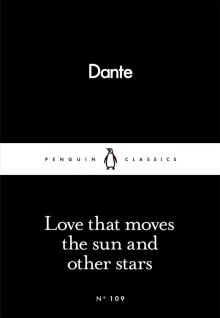 Love That Moves the Sun and Other Stars
Love That Moves the Sun and Other Stars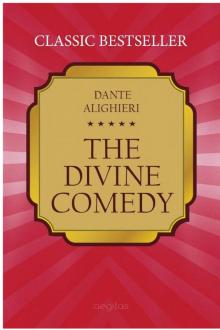 The Divine Comedy
The Divine Comedy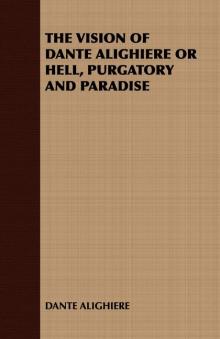 The Vision of Dante Alighiere or Hell, Purgatory and Paradise
The Vision of Dante Alighiere or Hell, Purgatory and Paradise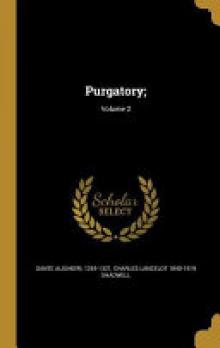 Purgatory
Purgatory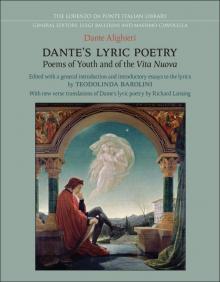 Dante's Lyric Poems (Italian Poetry in Translation)
Dante's Lyric Poems (Italian Poetry in Translation)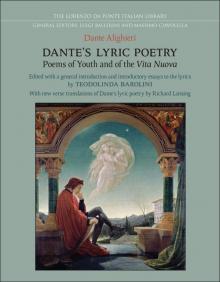 Dante's Lyric Poetry: Poems of Youth and of the 'Vita Nuova'
Dante's Lyric Poetry: Poems of Youth and of the 'Vita Nuova'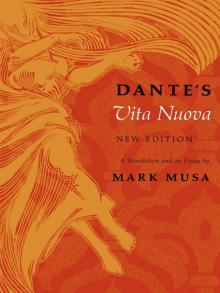 Dante’s Vita Nuova, New Edition: A Translation and an Essay
Dante’s Vita Nuova, New Edition: A Translation and an Essay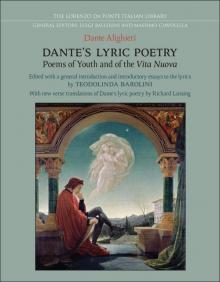 Dante's Lyric Poetry
Dante's Lyric Poetry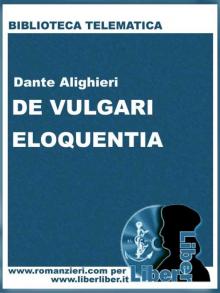 De vulgari eloquentia
De vulgari eloquentia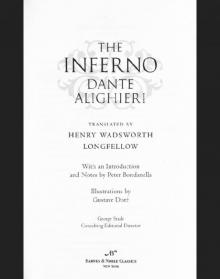 The Inferno (Barnes & Noble Classics Series)
The Inferno (Barnes & Noble Classics Series)